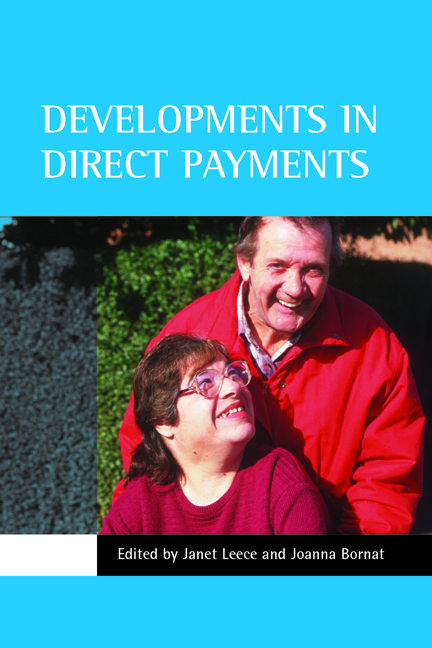Book contents
one - Introduction
Published online by Cambridge University Press: 18 January 2022
Summary
When Vic Finkelstein, the veteran disability rights activist, was imprisoned under the apartheid regime in South Africa, he recalls that, having insisted on the right to exercise, twice each day a black prisoner was detailed to push him “… round and round the courtyard (after I had been to the toilet)”. He remarks wryly that this was “[the] only time I have ever been given a free personal helper” (Finkelstein, 2002).
Forty years on, in another country, and under somewhat different conditions, direct payments legislation (the 1996 Community Care Direct Payments Act; the 2000 Carers and Disabled Children Act; the 2002 Community Care and Health (Scotland) Act) means that someone who has been assessed for community care can now be given a budget and choose how to spend the money allocated to them. If they want to pay for someone so that they can visit friends, go to a meeting, eat out at a restaurant, buy helpful equipment, spend time away from home or simply buy help with the basic tasks that use up all their energy, then the choice is theirs. As the website of the UK Department of Health (DH) explains: “Direct payments create more flexibility in the provision of social services. Giving money in place of social care services means people have greater choice and control over their lives, and are able to make their own decisions about how care is delivered”. (DH, 2004a).
For Vic Finkelstein and other disabled people, direct payments came into being as the result of decades of campaigning against a society which turns disabled people into dependants without choice, control or independence in their lives. Their organisations, the Union of Physically Impaired Against Segregation, the Disability Alliance and the British Council of Disabled People (BCODP), have been at the head of an international movement that sought and still seeks to establish a citizenship-based, human rights-defined case against disabled people’s exclusion from society (Campbell and Oliver, 1996). With the establishment by Act of Parliament in 2000 of the UK Disability Rights Commission came the incorporation in policy terms of independence and participation as rights:
4.1 There should be a basic enforceable right to independent living for all disabled people. Policy objectives for social care services need to include guaranteed minimum outcomes, backed up by a right to independence.
- Type
- Chapter
- Information
- Developments in Direct Payments , pp. 1 - 16Publisher: Bristol University PressPrint publication year: 2006



